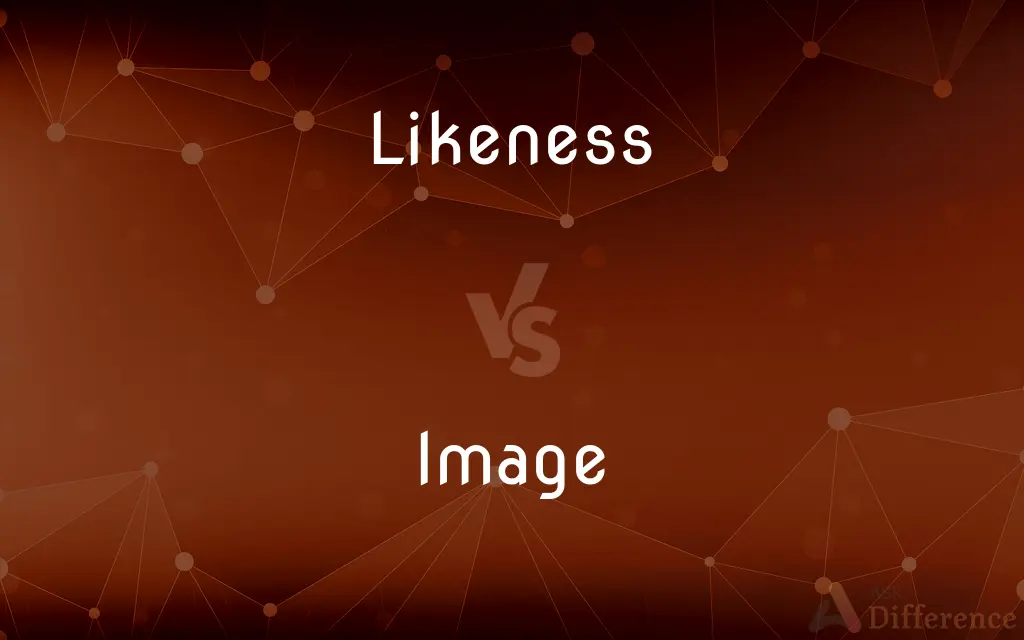Likeness vs. Image — What's the Difference?
By Tayyaba Rehman & Fiza Rafique — Updated on March 19, 2024
Likeness refers to similarity or resemblance between two entities, emphasizing qualities or characteristics in common. Image, however, often denotes visual representation, perception of someone or something, highlighting physical or conceptual depiction.

Difference Between Likeness and Image
Table of Contents
ADVERTISEMENT
Key Differences
Likeness implies a degree of similarity or resemblance that can exist between individuals, objects, or concepts, focusing on shared attributes or characteristics. It suggests a comparison that acknowledges similarities, which might not be purely visual but can include personality traits, behaviors, or abstract qualities. On the other hand, an image is primarily a visual or mental representation of an object, person, or scene. It encompasses photographs, paintings, and mental pictures, and extends to the way entities are portrayed or perceived in the mind or through media, emphasizing the physical or symbolic depiction over intrinsic qualities.
When discussing portraits or sculptures, likeness refers to how closely these artworks capture the physical or essential qualities of their subjects. In this context, likeness is concerned with accuracy and the depth of representation, including character and essence. Conversely, image in this scenario would refer to the physical or digital portrayal itself, focusing on the artwork's form, style, and medium, and how the subject is visually presented, irrespective of deeper resemblance or accuracy.
In the realm of branding and public relations, likeness is used to describe how closely a brand's public persona matches its intended values or identity. It's about consistency between what is projected and what is perceived. Image in this context refers to the constructed public perception or reputation of a brand or individual, shaped by marketing, media portrayals, and public actions, focusing on the external perception rather than intrinsic attributes.
The concept of likeness can also extend to ideas and abstract concepts, where it signifies similarity in nature, principle, or essence between different concepts or entities. Image, by contrast, often relates to the symbolic or representative depiction of these concepts, how they are visually or metaphorically illustrated or understood, rather than their inherent similarities.
Understanding the distinction between likeness and image enhances clarity in communication, especially in discussions about art, personality assessment, branding, and the portrayal of ideas. While likeness delves into the essence and similarities that foster a deeper connection or understanding, image concerns itself with visual representation, perception, and the exterior portrayal of individuals, entities, or concepts.
ADVERTISEMENT
Comparison Chart
Definition
Similarity or resemblance between entities.
Visual or mental representation of something.
Focus
Intrinsic qualities, characteristics.
Physical or conceptual depiction.
Contexts of Use
Portraits, personality assessment, branding consistency.
Artworks, photography, branding, public perception.
Concerns
Accuracy, depth of representation, essence.
Form, style, medium, symbolic depiction.
Examples
A sculpture capturing someone's character.
A photograph or painting of a person.
Compare with Definitions
Likeness
Likeness can pertain to abstract qualities or ideas shared between concepts.
The two theories have a likeness in their fundamental principles.
Image
Image is a visual or mental representation of an object, person, or concept.
The photograph captured the city's image perfectly.
Likeness
It is concerned with the depth of representation and true resemblance.
The siblings' likeness went beyond their physical appearance.
Image
It encompasses the construction of public perception.
Celebrities carefully curate their image on social media.
Likeness
It emphasizes the shared attributes or essence beyond just visual similarity.
Their personalities shared a likeness that deepened their friendship.
Image
It often pertains to how entities are perceived or portrayed.
The company sought to improve its public image through charity work.
Likeness
In art, it refers to capturing the subject's essence accurately.
The artist's goal was to achieve a likeness in mood and character.
Image
In art, image refers to the physical depiction or style.
The image was rendered in bold colors and abstract forms.
Likeness
Likeness denotes the resemblance or similarity in characteristics between entities.
The statue bore a striking likeness to the historical figure.
Image
Image extends to symbolic or metaphorical representations.
The novel used the storm as an image of turmoil.
Likeness
That which closely resembles; a portrait.
How he looked, the likenesses of him which still remain enable us to imagine.
Image
An image (from Latin: imago) is an artifact that depicts visual perception, such as a photograph or other two-dimensional picture, that resembles a subject—usually a physical object—and thus provides a depiction of it. In the context of signal processing, an image is a distributed amplitude of color(s).
Likeness
The fact or quality of being alike; resemblance
Her likeness to him was astonishing
A family likeness can be seen in all the boys
Image
A representation of the external form of a person or thing in art
Her work juxtaposed images from serious and popular art
Likeness
The state, quality, or fact of being like; resemblance.
Image
The general impression that a person, organization, or product presents to the public
She strives to project an image of youth
Likeness
A similar appearance; a semblance.
Image
A simile or metaphor
He uses the image of a hole to describe emotional emptiness
Likeness
A pictorial, graphic, or sculptured representation of something; an image.
Image
Make a representation of the external form of
Artworks which imaged women's bodies
Likeness
The state or quality of being like or alike
Image
A representation of the form of a person or object, such as a painting or photograph.
Likeness
Appearance or form; guise.
A foe in the likeness of a friend
Image
A sculptured likeness.
Likeness
To depict.
Image
(Physics) An optically formed duplicate, counterpart, or other representative reproduction of an object, especially an optical reproduction formed by a lens or mirror.
Likeness
The state or quality of being like; similitude; resemblance; similarity; as, the likeness of the one to the other is remarkable.
Image
One that closely or exactly resembles another
He is the image of his uncle.
Likeness
Appearance or form; guise.
An enemy in the likeness of a friend.
Image
Likeness; semblance
Genesis says that man was made in the image of God.
Likeness
That which closely resembles; a portrait.
[How he looked] the likenesses of him which still remain enable us to imagine.
Image
The opinion or concept of something that is held by the public
The public's image of business leaders as greedy.
Likeness
A comparison; parable; proverb.
He said to them, Soothly ye shall say to me this likeness, Leech, heal thyself.
Image
The concept or character projected to the public, as by a person or institution, especially as interpreted by the mass media
An actor who tried to convey an image of refined beauty.
Likeness
Similarity in appearance or character or nature between persons or things;
Man created God in his own likeness
Image
A typical example or embodiment
That child is the image of good health.
Likeness
Picture consisting of a graphic image of a person or thing
Image
A mental picture of something not real or present
Our image of the cottage did not conform with reality.
Image
A vivid description or representation in words, especially a metaphor or simile
The poem uses the image of a barren tree to convey feelings of desolation.
Image
(Mathematics) A set of values of a function corresponding to a particular subset of a domain.
Image
(Computers) An exact replica of the contents of a storage device, such as a hard disk, stored on a second storage device, such as a network server.
Image
(Obsolete) An apparition.
Image
To make or produce a likeness of
Imaged the poet in bronze.
Image
To mirror or reflect
A statue imaged in the water.
Image
To make a visual representation of (an object) using remote scanning or technology such as magnetic resonance imaging
Imaged the diseased kidneys.
Imaged the surface of Mars.
Image
To symbolize or typify
A kneeling woman imaging the nation's grief.
Image
To picture mentally; imagine or visualize
Imaged each dive before doing it.
Image
To describe, especially so vividly as to evoke a mental picture
The passage images what it's like to grow up poor.
Image
To print (a file) using a laser printer, imagesetter, direct-to-plate press, or similar device.
Image
To transmit (an exact replica of the contents of a storage device) to another storage device
Imaged the hard drive to the server.
Image
An optical or other representation of a real object; a graphic; a picture.
The Bible forbids the worship of graven images.
Image
A mental picture of something not real or not present.
Image
A statue or idol.
Image
(computing) A file that contains all information needed to produce a live working copy. (See disk image and image copy.)
Most game console emulators do not come with any ROM images for copyright reasons.
Image
A characteristic of a person, group or company etc., style, manner of dress, how one is or wishes to be perceived by others.
Image
(mathematics) What a function maps to.
The number 6 is the image of 3 under f that is defined as f(x) = 2x.
Image
(mathematics) The subset of a codomain comprising those elements that are images of something.
The image of this step function is the set of integers.
Image
(radio) A form of interference: a weaker "copy" of a strong signal that occurs at a different frequency.
Image
(obsolete) Show; appearance; cast.
Image
(transitive) To represent by an image or symbol; to portray.
Image
(transitive) To reflect, mirror.
Image
(transitive) To create an image of.
Image
To create a complete backup copy of a file system or other entity.
Image
An imitation, representation, or similitude of any person, thing, or act, sculptured, drawn, painted, or otherwise made perceptible to the sight; a visible presentation; a copy; a likeness; an effigy; a picture; a semblance.
Even like a stony image, cold and numb.
Whose is this image and superscription?
This play is the image of a murder done in Vienna.
And God created man in his own image.
Image
Hence: The likeness of anything to which worship is paid; an idol.
Thou shalt not make unto thee any graven image, . . . thou shalt not bow down thyself to them.
Image
Show; appearance; cast.
The face of things a frightful image bears.
Image
A representation of anything to the mind; a picture drawn by the fancy; a conception; an idea.
Can we conceiveImage of aught delightful, soft, or great?
Image
A picture, example, or illustration, often taken from sensible objects, and used to illustrate a subject; usually, an extended metaphor.
Image
The figure or picture of any object formed at the focus of a lens or mirror, by rays of light from the several points of the object symmetrically refracted or reflected to corresponding points in such focus; this may be received on a screen, a photographic plate, or the retina of the eye, and viewed directly by the eye, or with an eyeglass, as in the telescope and microscope; the likeness of an object formed by reflection; as, to see one's image in a mirror.
Image
To represent or form an image of; as, the still lake imaged the shore; the mirror imaged her figure.
Image
To represent to the mental vision; to form a likeness of by the fancy or recollection; to imagine.
Condemn'd whole years in absence to deplore,And image charms he must behold no more.
Image
An iconic mental representation;
Her imagination forced images upon her too awful to contemplate
Image
A visual representation (of an object or scene or person or abstraction) produced on a surface;
They showed us the pictures of their wedding
A movie is a series of images projected so rapidly that the eye integrates them
Image
(Jungian psychology) a personal facade that one presents to the world;
A public image is as fragile as Humpty Dumpty
Image
A standard or typical example;
He is the prototype of good breeding
He provided America with an image of the good father
Image
Language used in a figurative or nonliteral sense
Image
Someone who closely resembles a famous person (especially an actor);
He could be Gingrich's double
She's the very image of her mother
Image
A representation of a person (especially in the form of sculpture);
The coin bears an effigy of Lincoln
The emperor's tomb had his image carved in stone
Image
Imagine; conceive of; see in one's mind;
I can't see him on horseback!
I can see what will happen
I can see a risk in this strategy
Common Curiosities
Can two things have a likeness without looking alike?
Yes, two entities can share a likeness in abstract qualities, principles, or behaviors without having visual similarity.
Can likeness be non-visual?
Yes, likeness can be non-visual, referring to similarities in traits, behaviors, or abstract qualities.
Is an image always a physical object?
Not always; an image can also be a mental picture, a symbolic representation, or a digital depiction.
How do likeness and image contribute to identity?
Likeness contributes to a deeper understanding of identity through shared qualities, while image shapes the external perception of that identity.
Why is understanding the difference between likeness and image important?
Grasping the difference enhances communication and comprehension, especially in discussions related to art, personality, and branding.
What role does likeness play in portraiture?
In portraiture, likeness is crucial for capturing not just the physical appearance but also the character and mood of the subject.
What is the primary difference between likeness and image?
Likeness refers to similarity or resemblance, often in essence or characteristics, while image is about visual or mental representation.
How do likeness and image relate to branding?
Likeness in branding concerns how closely a brand’s identity matches its values, while image focuses on public perception and portrayal.
How is image used in art compared to likeness?
In art, image refers to the visual depiction (style, form), while likeness concerns how accurately this depiction captures the essence or character.
Is the public image of a person or brand always accurate?
No, the public image can be carefully constructed or manipulated and may not always accurately reflect the true nature or values.
Share Your Discovery

Previous Comparison
Field vs. Industry
Next Comparison
Hereditary vs. HeredityAuthor Spotlight
Written by
Tayyaba RehmanTayyaba Rehman is a distinguished writer, currently serving as a primary contributor to askdifference.com. As a researcher in semantics and etymology, Tayyaba's passion for the complexity of languages and their distinctions has found a perfect home on the platform. Tayyaba delves into the intricacies of language, distinguishing between commonly confused words and phrases, thereby providing clarity for readers worldwide.
Co-written by
Fiza RafiqueFiza Rafique is a skilled content writer at AskDifference.com, where she meticulously refines and enhances written pieces. Drawing from her vast editorial expertise, Fiza ensures clarity, accuracy, and precision in every article. Passionate about language, she continually seeks to elevate the quality of content for readers worldwide.













































